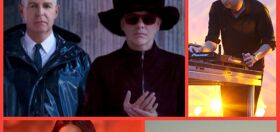
It was Election Night 2016, and unlike most Americans–whose eyes were peeled to the TV–Heather Gilfillan was in her bed, blissfully asleep.
“I actually had to wake up super early the next day for class, so wasn’t able to stay up [that night],” Gilfillan, who identifies as bisexual, tells Queerty. “But before I had gone to bed, it didn’t seem like Trump was going to win. I went to bed feeling hopeful.”
But as soon as she woke up, Gilfillan’s state of happiness quickly turned dark. She recalls going on her phone to check Twitter, only to see a celebratory Tweet from a local Trump supporter. It seemed her worst fears had been confirmed: Trump had won, and was now going to be President.
“It was difficult for me to even get out of bed. I went to my class, and I actually couldn’t even stay for the whole thing because I was so frustrated and upset,” she says. “Seeing people walk around with huge smiles on their faces made it so much worse.”
How about we take this to the next level?
Our newsletter is like a refreshing cocktail (or mocktail) of LGBTQ+ entertainment and pop culture, served up with a side of eye-candy.
Unfortunately, nearly three years later, things have not fared much better for Gilfillan, who represents one of thousands, if not millions, of LGBTQ people living in conservative places around the country.
Gilfillan resides in Stillwater, a rural farming town located in northern New Jersey. The town is home to 3,920 residents, most of whom are white, conservative Republicans. Nearly all of them are “close-minded” and “not accepting of anyone that isn’t white and straight,” according to Gilfillan.
In fact, it’s common to hear the word “f*g” tossed around like “it’s nothing at all,” and any kind of emotion shown by men is “considered gay,” she says. When gay marriage became legal in the United States, Gilifallan would often hear people in Stillwater complain because “they absolutely hated hearing about anything to do with the LGBTQ community.”
As a bisexual woman, Stillwater is an odd place for Gilfillan to be.
“It’s so strange. I don’t see it anywhere else,” Gilfillan says. “The fact that you can come here and still see Trump signs is extremely embarrassing. Like, there’s one that’s drilled almost 15 feet up a tree trunk so that nobody can take it down. It feels almost cult-like. People still have Trump bumper stickers on their cars, wear Trump hats and shirts, and talk about him like he’s some kind of God.”
That said, Gilfillan’s experience is not representative of all LGBTQ individuals living in red states.
Just ask Jacob Balash, who lives in the small town of Spencer, Indiana (population: 2,250) with his husband, Jonathan. Balash, who identifies as gay, is the co-founder of Spencer Pride, an annual festival the town has held for the last 13 years.
Even though he lives in a red state (Trump won the election in Indiana with more than 56% of the vote), Balash says his town and its festival is a living testament to the fact that not all red areas are full of conservative, closed-minded people.
“One of the things that surprised us when we started Spencer Pride was how many progressive people were already living here and had spent their entire lives here,” he says. “Until we came and [started Spencer Pride], there hadn’t been an opportunity for other like-minded people to show their support.”
That said, it hasn’t been all positive. “We’ve experienced some vandalism,” Balash admits. “Our pride flag has been stolen more times than I can count, our mailbox has been destroyed, and we’ve had a few eggs thrown at our property.”
During one recent incident, two teenagers vandalized Balash’s property, damaged a flag pole, and stole their pride flag.
“When interviewed by the Sheriff’s department, [the teens] confessed that they had done this because we were ‘big time queers,’” Balash says with a laugh. “I’m glad to know we’ve finally hit the big time. That must mean we are making a difference if these kids were so insecure about the makeup of my family.”
Following the incident, Balash says more than 200 community members hung up pride flags in their homes as a show of support. He also created and printed a batch of ‘Big Time Queers’ T-shirts, all of which sold out shortly after they were made.
Because of the kind of support he has seen in his town, Balash has no plans to relocate to a larger, more accepting city, such as New York or Los Angeles.
“I feel passionately that progressive-minded people should stay put and help make change where they are,” he says. “If everyone who is open-minded flees to the coasts, the middle of the country will never change.”
Kedryn McElderry, a gay male who lives in Kalispell, Montana, and who just this month helped organize Kalispell’s first ever Pride Festival alongside the town’s non-profit, Love Lives Here, shares similar thoughts. Though he still acknowledges that bigotry is alive and well in rural areas.
In one instance last April, a Kalispell-based parent sent a letter to the local newspaper after someone read “Prince & Knight,” a gay-inclusive fairytale, to a group of preschoolers at the town’s library.
In the letter, the parent said she considered the topic of gay marriage to be “totally inappropriate for an audience of preschoolers,” and was disappointed the librarian did not notify her in advance that she would “introduce such a controversial subject to innocent children.”
Even with instances like these, McElderry believes progress is being made.
“I can tell you for certain that our climate here is changing, but in different ways than we expect,” he said. “Sure, things get really bad for periods of time, we have incidents with churches and newspapers, but those bring gifts of their own. Allies come out of the woodwork and rally support, businesses open their doors, and connections are made [between organizations and allies alike].”
And as for Gilfillan? Well, don’t expect her to stick around Stillwater, New Jersey much longer.
“I enjoy little to nothing about my town,” she says, bluntly. “The people here are racist, sexist, and homophobic and it’s honestly exhausting. Once I finish school and have enough money to move out and start my life, I’m going to move very far away from here.”
But not before she attends WorldPride in New York City. After all, it’s only a state away, and is a celebration Gilfillan is all but blissful to take part in as an LGBTQ individual.
“Pride means a lot to me,” she says. “Each time I go [to Pride], I can’t help but cry tears of joy for a minute or two. I think it’s so important to celebrate how far the world has come in accepting the LGBTQ community. Being unapologetically you is something to celebrate, and I love the fact that we have an entire month to do that.”
























GayEGO
It seems that most small rural towns have GOPs who are blind to reality, I guess they are not interested in learning and evolving with the rest of us.
fur_hunter
No…..They are NOT blind to reality. They CHOOSE to remain IGNORANT. They would much rather use words in a 1500-year-old book written by MEN as their reference for their understanding. I want to know how many of them would go to a doctor who uses a medical book written over 1500 years ago to treat his patients? If they say they would, they are F cking LIARS. If they say they wouldn’t, they are F ucking HYPOCRITES! Ignorance, stupidity, intolerance and bigotry are CHOSEN!
LucasScott1372
You are right
Mikey E
“LGBTQ individual”
Cam
I see the anti-LGBTQ troll account is trying to deflect from bigotry in Republican areas by trying to direct the thread to whining about some letters.
Tombear
I was raised in the Evangelical church. When I came out at 15 the minster told my mother and father they had to disown me and kick me out into the street! My mother told the minister that she was disowning the church. My parents are wonderful people who I love very much.
Patrick
To Tombear – kudos to your parents!
batesmotel
Stay where you are the big cities are over crowded. And there are homophobes in big cities too. It’s a myth to assume it’s all progressive and open minded.
Thad
But only one county from Stillwater, Morris County offers a vibrant gay presence and a gay activist group equal to any. Suburban gay people are no longer the “left behind” “not good enough.” Some communities are tough, agreed, but a surprisingly short distance can change everything.
Jared MacBride
New Jersey is NOT a red state, let alone a “deep” red state. Ms. Clinton got 55.5% of the vote there.
J W G
I live in a rural “blue state’ in New England. There is only one city in the entire state that holds at least 40 percent of the states population. Nevertheless, The area I live is rural, this is New England so there is very little outward hostility toward LGBT people but they keep a ‘polite’ distance and so don’t expect any invites to the barbecue . It’s amazing, they smile and give you a friendly greeting while you’re being stonewalled but I don’t take it personally, this is not the friendliest place in the country for any outsiders to live as it is . They just do not understand it, it’s out of their comfort zone. I won’t get into what happens after a few beers with these farmers but the hypocrisy never ceases to confound me . Homophobia is fear. Try being a gay conservative, tell somebody at the gun range that you’re as queer as a three dollar bill. Talking about the proverbial awkward moment! When you break the stereotype, it kicks them right in the gonads.
Kennyg15
It really has no difference if your a blue state, red state, dumacrat or repuklican, its how you are raised. Brought up with good values, tolerance, education and love is the key. There are good people out there, regardless of what party you belong to, but it first starts with your family, and who you wish to associate with. I have good friends and family which are educated and will do anything they can to move forward in the world. This means a lot to all of us, regardless of who we are.